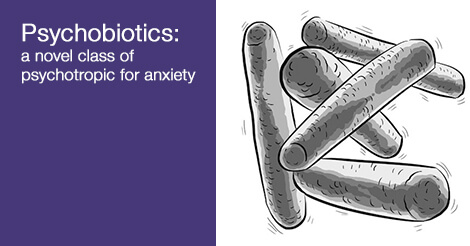
We now know that good bacteria or probiotics have the potential to alter brain chemistry and have an impact on anxiety and depression. You may recall my interview with Professor Ted Dinan on a prior Anxiety Summit – Microbes in the gut and psychobiotics as a potential treatment for anxiety and depression. He shared his paper and this definition of Psychobiotics: a novel class of psychotropic.
…we define a psychobiotic as a live organism that, when ingested in adequate amounts, produces a health benefit in patients suffering from psychiatric illness. As a class of probiotic, these bacteria are capable of producing and delivering neuroactive substances such as gamma-aminobutyric acid and serotonin, which act on the brain-gut axis.
Research published by Dinan, Cryan and their teams also found benefits of Lactobacillus rhamnosus on stress, anxiety and depression type behaviors in mice. This is older research (published in 2011) but it’s the first time I’ve shared it on the blog. I talk about this paper in the upcoming Microbiome Medicine 2 Summit so I like to share study excerpts and links to the study.
The write up in Science Daily is a good one – Mind-Altering Microbes: Probiotic Bacteria May Lessen Anxiety and Depression
…mice fed with Lactobacillus rhamnosus JB-1 showed significantly fewer stress, anxiety and depression-related behaviours than those fed with just broth. Moreover, ingestion of the bacteria resulted in significantly lower levels of the stress-induced hormone, corticosterone.
The part that I find fascinating is the effects of Lactobacillus on GABA receptors in the brain (GABA is your main calming neurotransmitter):
The researchers also showed that regular feeding with the Lactobacillus strain caused changes in the expression of receptors for the neurotransmitter GABA in the mouse brain, which is the first time that it has been demonstrated that potential probiotics have a direct effect on brain chemistry in normal situations.
In this paper the authors discuss the vagus nerve and the three-way communication:
…the vagus nerve is the main relay between the microbiome (bacteria in the gut) and the brain. This three way communication system is known as the microbiome-gut-brain axis and these findings highlight the important role of bacteria in the communication between the gut and the brain, and suggest that certain probiotic organisms may prove to be useful adjunct therapies in stress-related psychiatric disorders.
What is even more fascinating is this:
the neurochemical and behavioral effects were not found in vagotomized mice
What does this mean? When the researchers severed the vagus nerve in the test mice – removing the communication between the gut and the brain – they found that the behaviors and stress hormone levels reverted back to the way they had been i.e. the vagotomized mice were more anxious, more stressed, more depressed and had higher corticosterone levels.
You can find the abstract of the paper here: Ingestion of Lactobacillus strain regulates emotional behavior and central GABA receptor expression in a mouse via the vagus nerve.
What does this mean for you? It means that good bacteria in your diet could well improve your anxiety and depression symptoms and even have an impact on your adrenals and cortisol levels. This could be in the form of a good probiotic and should always include fermented foods like sauerkraut, kimchi, kombucha, yogurt and kefir (if dairy is tolerated), water kefir (if dairy is not tolerated).
Have you observed an improvement in your anxiety and stress levels since adding a probiotic or fermented foods into your diet?


